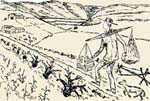|
Making Butter
by
Specific instructions on the proper way to make butter
long before today's mass production processes
From the Country Gentleman magazine
reprinted in the Chenango Union, Norwich, N. Y.
May 5, 1869
For making good butter, the first thing was to have a “good sweet”
pasture, free from weeds or any growth that might give a bad taste to
the milk; good upland grass was considered better than coarse grass growing
in wet areas. The instruction said; “some dairymen think that limed
is better than unlimed land, but this is a matter of minor importance.
Others regard the practice of sowing plaster in the spring, and repeating
it early in the autumn, as tending to sweeten grass.”
Good well-selected cows were the next requisite. “Perfect cleanliness,
from beginning to end, is indispensable—the most so, perhaps, of
any one thing. No dust or dirt must drop into the milk, for which reason
the animals should have a clean place to lie on, and never be allowed
to stand in mud or manure, vessels all thoroughly washed—washed
whenever necessary to preserve perfect sweetness—including pails,
pans, pots, churns, workers and tubs or firkins.”
The instructions recommended washing the utensils in cold water [first];
for if hot water were used first, it would curdle the milk in the cracks
or corners, and prevent it from being washed out.
Perfect atmosphere was important. Bad odors will taint butter. The dairy
barn therefore should be far away from manure piles and everything else
of the sort.
“Keep tobacco smoke off the premises.
“Let the butter be well worked, so as to press out all the buttermilk.
It is impossible to have a good article if this is not done. Perhaps this
is the most common cause of failure. If milk is left in, it soon ferments
and makes rancid and worthless butter.”
In getting things ready for winter, it was recommended to use new firkins
(cheese containers). They should never be used a second time.
“Pots or jars must not be used if they've had butter in them, or
pickles or anything else that will taint them—the taint can never
be wholly removed.”
The instructions concluded:
“The best dairy salt is important. Butter in hot weather must be
covered and excluded from air with saturated brine.”
| 


